- Clone
- MWReg30 (See other available formats)
- Regulatory Status
- RUO
- Other Names
- Fibrinogen receptor, gpIIb/IIIa, integrin alpha IIb, CD41a
- Isotype
- Rat IgG1, κ
- Ave. Rating
- Submit a Review
- Product Citations
- publications
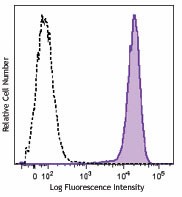
-

C57BL/6 platelets were stained with CD41 (clone MWReg30) Brilliant Violet 421™ (filled histogram) or rat IgG1, κ Brilliant Violet 421™ isotype control (open histogram).
| Cat # | Size | Price | Save |
|---|---|---|---|
| 133911 | 125 µL | ¥44,880 | |
| 133912 | 50 µg | ¥63,230 |
CD41, also known as integrin α2b and GPIIb, is a transmembrane glycoprotein that is expressed by platelets and megakaryocytes. It was reported that CD41 is also expressed on hematopoietic progenitors. CD41 associates with CD61 (integrin β3) to form complexes that interact with fibrinogen, fibronectin, von Willebrand factor, and thrombin. CD41 is required for platelet adhesion and aggregation. Defect of CD41 leads to disorders of coagulation.
Product DetailsProduct Details
- Verified Reactivity
- Mouse
- Antibody Type
- Monoclonal
- Host Species
- Rat
- Immunogen
- Mouse platelets
- Formulation
- Phosphate-buffered solution, pH 7.2, containing 0.09% sodium azide and BSA (origin USA).
- Preparation
- The antibody was purified by affinity chromatography and conjugated with Brilliant Violet 421™ under optimal conditions.
- Concentration
- µg sizes: 0.2 mg/mLµL sizes: lot-specific (to obtain lot-specific concentration and expiration, please enter the lot number in our Certificate of Analysis online tool.)
- Storage & Handling
- The antibody solution should be stored undiluted between 2°C and 8°C, and protected from prolonged exposure to light. Do not freeze.
- Application
-
FC - Quality tested
- Recommended Usage
-
Each lot of this antibody is quality control tested by immunofluorescent staining with flow cytometric analysis. For flow cytometric staining using the µl size, the suggested use of this reagent is 5 µl per million cells in 100 µl staining volume or 5 µl per 100 µl of whole blood. For flow cytometric staining using the µg size, the suggested use of this reagent is ≤0.5 µg per million cells in 100 µl volume. It is recommended that the reagent be titrated for optimal performance for each application.
Brilliant Violet 421™ excites at 405 nm and emits at 421 nm. The standard bandpass filter 450/50 nm is recommended for detection. Brilliant Violet 421™ is a trademark of Sirigen Group Ltd.
Learn more about Brilliant Violet™.
This product is subject to proprietary rights of Sirigen Inc. and is made and sold under license from Sirigen Inc. The purchase of this product conveys to the buyer a non-transferable right to use the purchased product for research purposes only. This product may not be resold or incorporated in any manner into another product for resale. Any use for therapeutics or diagnostics is strictly prohibited. This product is covered by U.S. Patent(s), pending patent applications and foreign equivalents. - Excitation Laser
-
Violet Laser (405 nm)
- Application Notes
-
Additional reported applications (for the relevant formats) include: depletion of platelets and functional assay in vivo.4,7 The Ultra-LEAF™ purified antibody (Endotoxin < 0.01 EU/µg, Azide-Free, 0.2 µm filtered) is recommended for in vivo studies (Cat. No. 133939).
-
Application References
(PubMed link indicates BioLegend citation) -
- Nieswandt B, et al. 1999. Blood 94:684.
- Teeling JL, et al. 2001. Blood 98:1095.
- Bertrand JY, et al. 2005. P. Natl. Acad. Sci. USA 102:134.
- Nocito A, et al. 2007. Hepatology 45:369. (Deplete)
- Sullivan BP, et al. 2010. Toxicol. Sci. 115:286. (Deplete) PubMed
- van der Heyde HC, et al. 2005. Blood 105:1956. (FA)
- Marjon KD, et al. 2009. J. Immunol. 182:1397. (Deplete)
- Product Citations
-
- RRID
-
AB_10960744 (BioLegend Cat. No. 133911)
AB_2650893 (BioLegend Cat. No. 133912)
Antigen Details
- Structure
- A transmembrane glycoprotein that is expressed by platelets and megakaryocytes
- Distribution
-
Platelets, megakaryocytes, and hematopoietic progenitors
- Function
- Associate with CD61 (integrin β3) to form a complex which plays a major role in platelet adhesion and aggregation
- Ligand/Receptor
- Fibrinogen, fibronectin, von Willebrand factor, thrombin
- Cell Type
- Hematopoietic stem and progenitors, Megakaryocytes, Platelets
- Biology Area
- Immunology
- Molecular Family
- Adhesion Molecules, CD Molecules
- Antigen References
-
1. Bakewell SJ, et al. 2003. P. Natl. Acad. Sci. USA 100:14205.
2. Phillips DR, et al. 1991. Cell. 65:359. - Gene ID
- 16399 View all products for this Gene ID
- UniProt
- View information about CD41 on UniProt.org
Related Pages & Pathways
Pages
Related FAQs
- What is the F/P ratio range of our BV421™ format antibody reagents?
-
It is lot-specific. On average it ranges between 2-4.
Other Formats
View All CD41 Reagents Request Custom Conjugation| Description | Clone | Applications |
|---|---|---|
| Brilliant Violet 421™ anti-mouse CD41 | MWReg30 | FC |
| Purified anti-mouse CD41 | MWReg30 | FC,FA |
| FITC anti-mouse CD41 | MWReg30 | FC |
| PE anti-mouse CD41 | MWReg30 | FC |
| Alexa Fluor® 488 anti-mouse CD41 | MWReg30 | FC |
| APC anti-mouse CD41 | MWReg30 | FC |
| PE/Cyanine7 anti-mouse CD41 | MWReg30 | FC |
| PerCP/Cyanine5.5 anti-mouse CD41 | MWReg30 | FC |
| Brilliant Violet 605™ anti-mouse CD41 | MWReg30 | FC |
| Brilliant Violet 510™ anti-mouse CD41 | MWReg30 | FC |
| Purified anti-mouse CD41 (Maxpar® Ready) | MWReg30 | FC,CyTOF® |
| APC/Cyanine7 anti-mouse CD41 | MWReg30 | FC |
| Alexa Fluor® 700 anti-mouse CD41 | MWReg30 | FC |
| Biotin anti-mouse CD41 | MWReg30 | FC |
| Pacific Blue™ anti-mouse CD41 | MWReg30 | FC |
| Alexa Fluor® 647 anti-mouse CD41 | MWReg30 | FC |
| PE/Dazzle™ 594 anti-mouse CD41 | MWReg30 | FC |
| TotalSeq™-A0443 anti-mouse CD41 | MWReg30 | PG |
| Ultra-LEAF™ Purified anti-mouse CD41 | MWReg30 | FC,FA |
| TotalSeq™-B0443 anti-mouse CD41 | MWReg30 | PG |
| TotalSeq™-C0443 anti-mouse CD41 | MWReg30 | PG |
Customers Also Purchased
Compare Data Across All Formats
This data display is provided for general comparisons between formats.
Your actual data may vary due to variations in samples, target cells, instruments and their settings, staining conditions, and other factors.
If you need assistance with selecting the best format contact our expert technical support team.
-
Brilliant Violet 421™ anti-mouse CD41
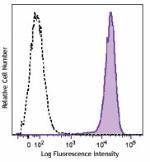
C57BL/6 platelets were stained with CD41 (clone MWReg30) Bri... -
Purified anti-mouse CD41
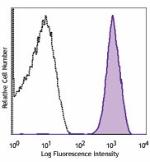
C57 BL/6 platelets were stained with CD41 (clone:MWReg30) (f... -
FITC anti-mouse CD41
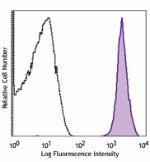
C57 BL/6 platelets were stained with CD41 (clone: MWReg30) F... -
PE anti-mouse CD41
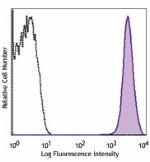
C57 BL/6 platelets were stained with CD41 (clone: MWReg30) P... -
Alexa Fluor® 488 anti-mouse CD41
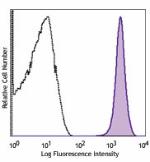
C57 BL/6 platelets were stained with CD41 (clone: MWReg30) A... -
APC anti-mouse CD41
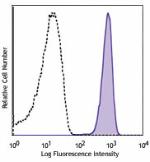
Mouse platelets were stained with either anti-mouse CD41 (cl... -
PE/Cyanine7 anti-mouse CD41
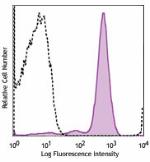
Mouse platelets were stained with anti-mouse CD41 (clone MWR... -
PerCP/Cyanine5.5 anti-mouse CD41
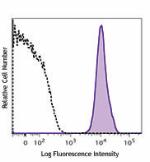
Mouse platelets were stained with anti-mouse CD41 (clone MWR... -
Brilliant Violet 605™ anti-mouse CD41
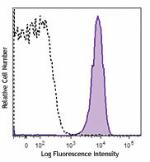
C57BL/6 platelets were stained with CD41 (clone MWReg30) Bri... -
Brilliant Violet 510™ anti-mouse CD41
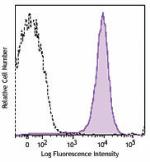
C57BL/6 platelets were stained with CD41 (clone MWReg30) Bri... -
Purified anti-mouse CD41 (Maxpar® Ready)
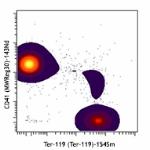
Platelets isolated from mouse blood were stained with 143Nd-... -
APC/Cyanine7 anti-mouse CD41
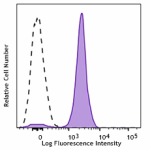
BALB/c mouse platelets were stained with CD41 (clone MWReg30... -
Alexa Fluor® 700 anti-mouse CD41
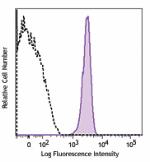
BALB/c mouse platelets were stained with CD41 (clone MWReg30... -
Biotin anti-mouse CD41
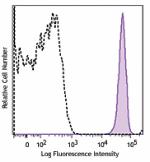
BALB/c mouse platelets were stained with biotinylated CD41 (... -
Pacific Blue™ anti-mouse CD41
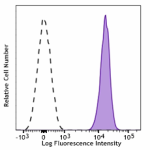
BALB/c mouse platelets were stained with CD41 (clone MWReg30... -
Alexa Fluor® 647 anti-mouse CD41
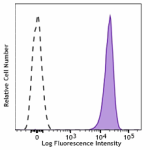
BALB/c mouse platelets were stained with CD41 (clone MWReg30... -
PE/Dazzle™ 594 anti-mouse CD41
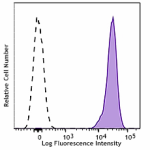
BALB/c mouse platelets were stained with CD41 (clone MWReg30... -
TotalSeq™-A0443 anti-mouse CD41
-
Ultra-LEAF™ Purified anti-mouse CD41

C57 BL/6 platelets were stained with CD41 (clone MWReg30) (f... -
TotalSeq™-B0443 anti-mouse CD41
-
TotalSeq™-C0443 anti-mouse CD41












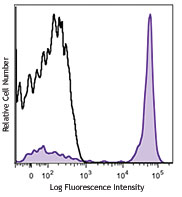

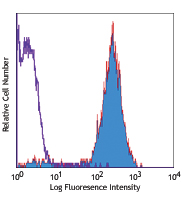
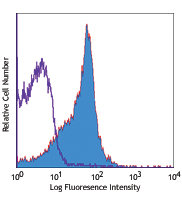



Follow Us